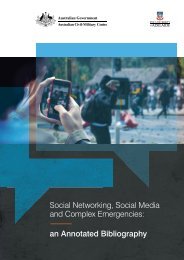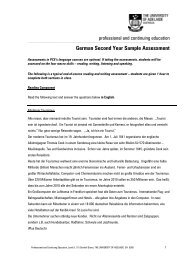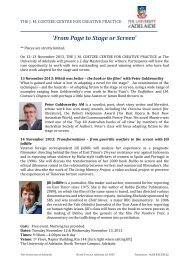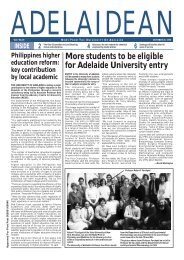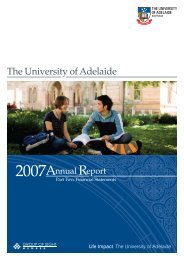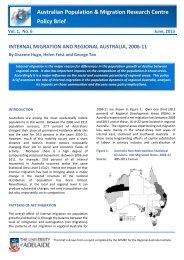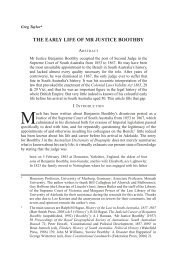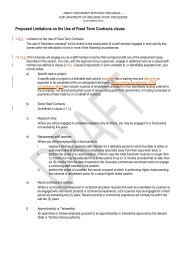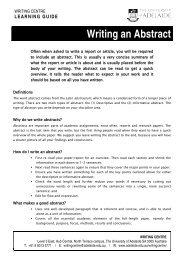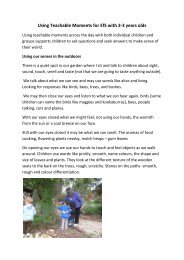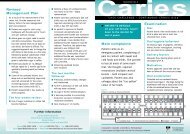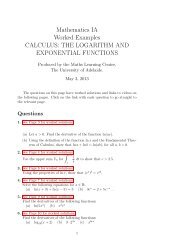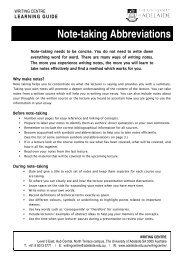Unbridling the Tongues of Women - The University of Adelaide
Unbridling the Tongues of Women - The University of Adelaide
Unbridling the Tongues of Women - The University of Adelaide
You also want an ePaper? Increase the reach of your titles
YUMPU automatically turns print PDFs into web optimized ePapers that Google loves.
Round woman in her round hole<br />
Four years later she had abandoned both her own and Pearson’s remedies for<br />
economic inequality to argue for <strong>the</strong> introduction <strong>of</strong> a single tax. She was cautiously<br />
enthusiastic about Henry George’s proposal. It ‘first takes <strong>the</strong> startling shape <strong>of</strong> confiscation<br />
<strong>of</strong> land’ she wrote, ‘<strong>the</strong>n s<strong>of</strong>tens down to confiscation <strong>of</strong> rent; and finally<br />
settles down to <strong>the</strong> drawing <strong>of</strong> all taxation from <strong>the</strong> land, and <strong>the</strong> land alone’. She<br />
did not ‘anticipate such glorious results’ from this measure as George did, but she did<br />
‘anticipate a greater amount <strong>of</strong> benefit than from any o<strong>the</strong>r reform in <strong>the</strong> world’. 36<br />
Spence was to claim that she had pioneered <strong>the</strong> single tax movement in Australia in<br />
<strong>the</strong> Victorian Review in 1881, but her claim does not hold. Progress and Poverty had<br />
been serialized two years earlier in a Sydney newspaper, and George did not tour<br />
Australia until 1890. <strong>The</strong> vociferous single tax movement in South Australia, which<br />
developed out <strong>of</strong> <strong>the</strong> Anti-Poverty Society in <strong>the</strong> wake <strong>of</strong> George’s tour, had not noticed<br />
her article, printed nine years earlier, in ano<strong>the</strong>r colony. 37<br />
By <strong>the</strong> time Spence visited <strong>the</strong> United States in 1893, her argument for greater<br />
economic equity was broader, vaguer, and far more sweeping. Against <strong>the</strong> competition<br />
and monopolies <strong>of</strong> a society dominated by <strong>the</strong> ‘plutocrat’ she asserted <strong>the</strong><br />
spirit <strong>of</strong> ‘<strong>the</strong> true Democrat’. She considered her attack, itself, <strong>the</strong> first step towards<br />
reform. ‘<strong>The</strong> diagnosis <strong>of</strong> <strong>the</strong> disease’ she argued ‘is … an important part <strong>of</strong> <strong>the</strong><br />
physician’s work, and for <strong>the</strong> ailments <strong>of</strong> society it is necessary first to see how we<br />
stand and <strong>the</strong>n to endeavour to discover in what direction we should move’. <strong>The</strong><br />
direction she proposed was co-operation. In ‘social intercourse’ this meant ‘welcoming<br />
a friend to such a dinner as we eat everyday, and as he eats everyday’, instead <strong>of</strong><br />
collecting ‘a number <strong>of</strong> people to whom we owe dinners, for something which is <strong>the</strong><br />
daily set-out <strong>of</strong> people three or four times richer than we are but which costs time,<br />
money, and fatigue for us’. It substituted ‘evening receptions’ where husbands and<br />
wives might meet each o<strong>the</strong>rs’ friends, and where young men and women might<br />
become acquainted, in place <strong>of</strong> <strong>the</strong> ‘one-sided … one-sexed’ social intercourse <strong>of</strong><br />
clubs and afternoon calls, and ‘courting … done no one knows exactly where’. In<br />
industry, co-operation meant joint labour and enterprise for mutual benefit, instead<br />
<strong>of</strong> competition. In politics it meant equitable representation and co-operation <strong>of</strong> ‘<strong>the</strong><br />
party <strong>of</strong> order and <strong>the</strong> party <strong>of</strong> progress’ for <strong>the</strong> benefit <strong>of</strong> <strong>the</strong> whole people. Such<br />
recognition <strong>of</strong> mutual dependence and service should engender a sense <strong>of</strong> security<br />
and create genuine democracy. <strong>The</strong> ‘true democratic spirit’, she contended,<br />
is that <strong>of</strong> activity, yet also <strong>of</strong> repose. Not eager to rise, not fearful lest it<br />
fall, it plants its foot firmly on <strong>the</strong> daily task. This sense <strong>of</strong> security is what<br />
115



